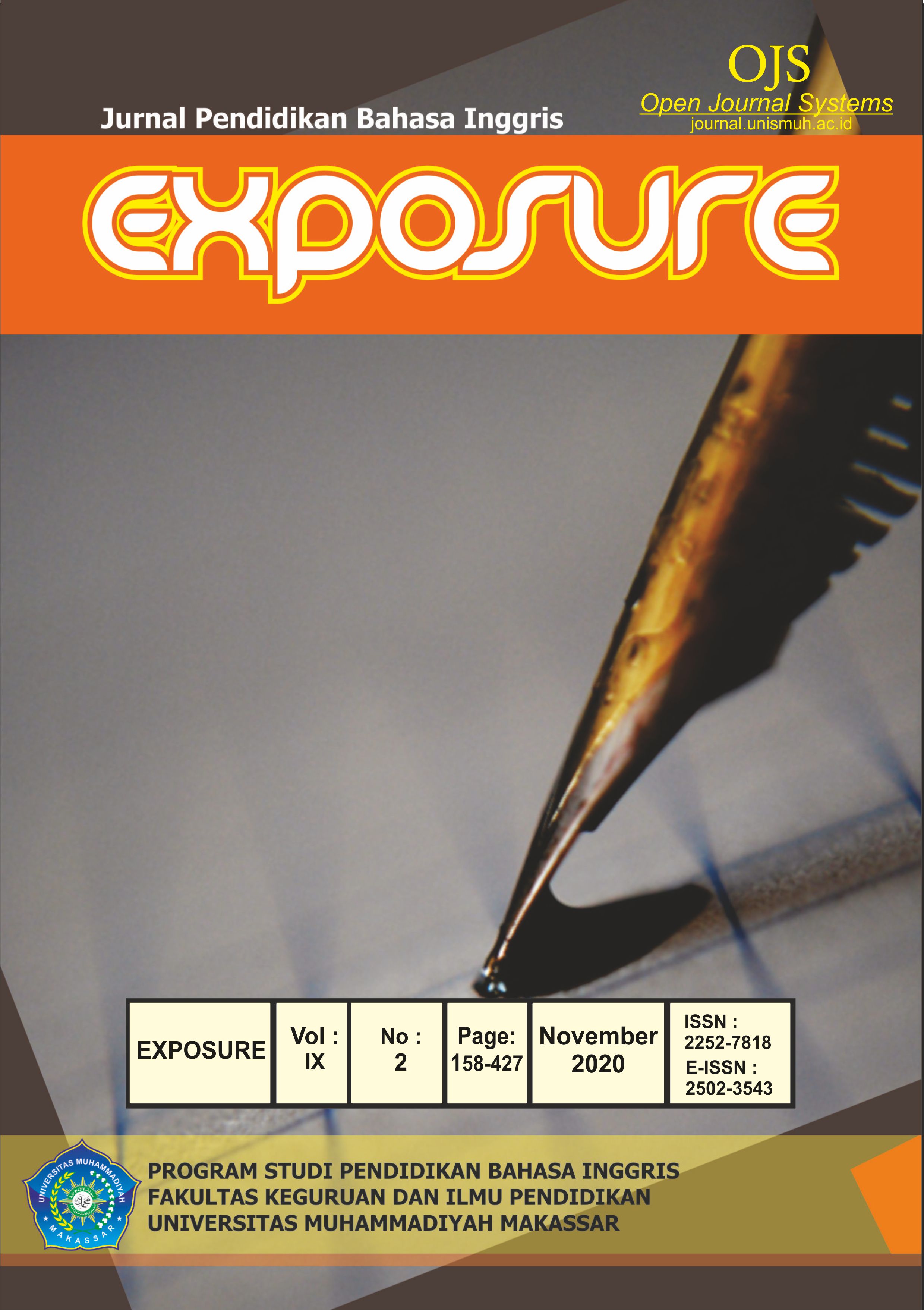THE IMPROVEMENT OF KKNI BASED LEARNING MODEL THROUGH COLLABORATIVE LEARNING IN ENGLISH FOR JOB HUNTING SUBJECT
DOI:
https://doi.org/10.26618/exposure.v9i2.4146Keywords:
KKNI Curriculum, Collaborative Model, English for Job HuntingAbstract
Based on the road map in the field of Education and Family Empowerment (IPPK), one of them is a learning model based on the KKNI curriculum. However, based on field observations, this is not in accordance with the concept of learning in the curriculum. Thus, the specific purpose of this research is to formulate the concept of learning based on the KKNI curriculum at University of Muslim Nusantara (UMN) Al Washliyah. The research method is development research with ADDIE design. The population was all students in the eighth semester of the English language education program academic year 2019/2020, so the sample was taken randomly totaling 30 students. Data collection techniques were questionnaire and observation, with data analysis techniques used IBM SPSS 22 for Windows factor analysis. The results obtained at this stage, it is known that students only choose 2 categories of assessment, which is good enough by 80% (24 students), and not good enough by 20% (6 students) from several indicators including preferences for subjects, difficulties encountered in learning, the atmosphere of learning, learning methods, guidance and direction of the lecturer concerned, the provision of pre-test, post-test and assignments, the suitability of the material with the test and the provision of grades so that the best solution is to design a book containing lecture activities in accordance with the customized KKNI curriculum with subjects especially English for Job Hunting courses with the application of collaborative model so that the learning process becomes interactive, active and attractive.References
Amri, Sofan, dan Ahmadi, Lif Khoiru. 2010. Konstruksi Pengembangan Pembelajaran. Jakarta: Prestasi Pustaka
Direja, Ardi Cahya. 2017. Studi Implementasi Kurikulum Berbasis KKNI pada Program Studi Ilmu Komputer Universitas Informatika dan Bisnis Indonesia. Jurnal Edutech Vol.16 No.2.
Maba, Wayan. Kurikulum Sarjana Berbasis KKNI, Mengubah Mindset Pengajaran Menjadi Pembelajaran. Jurnal Bakti Saraswati Vol. 05 No. 01, ISSN: 2088-2149.
Maridi, Drs. M.Pd, 2009. Penerapan Model Collaborative Learning. Seminar Lokakarya Nasional Pendidikan Biologi. FKIP UNS.
Solikhah, I. 2015. KKNI dalam kurikulum Berbasis Learning Outcomes. LINGUA. Journal of Language, Literature and Technology, 12 (1), 1-22.
Sudrajat, Didi. 2018. Kurikulum Pendidikan Bahasa Inggris Berbasis KKNI. Prosedur Pengembangan dan Implementasinya. Jurnal Intelegensia Vol. 3 No. 1. Universitas Kutai Kartanegara
Sugiono. 2010. Metode Penelitian Pendidikan Pendekatan Kuantitatif, Kualitatif dan R&D. Bandung: Penerbit Alfabeta
Suteja, Jaja. 2017. Model- model Pembelajarann dalam Kurikulum Berbasis Kompetensi KKNI di Perguruan Tinggi. Jurnal Edueksos Vo. VI No. 1. IAIN Syekh Nurjati Cirebon
Tim Penyusun. 2016. Rencana Strategis (Renstra) Penelitian Universitas Muslim Nusantara (UMN) Al Washliyah (2016-2020). Universitas Muslim Nusantara Al Washliyah. Medan.
Wahyuningtias, Hani. 2016. Penerapan Metode Collaborative Learning dalam Pembelajaran Karya Sastra Novel Berjudul “Yukiguni”. Jurnal Bahasa Asing Vol. 12 No. 12.
Downloads
Published
Issue
Section
License
Authors who publish with this journal agree to the following terms:
In order to assure the highest standards for published articles, a peer review policy is applied. In pursue of the compliance with academic standards, all parties involved in the publishing process (the authors, the editors and the editorial board and the reviewers) agree to meet the responsibilities stated below in accordance to the Journal publication ethics and malpractice statement.
Duties of Authors:
- The author(s) warrant that the submitted article is an original work, which has not been previously published, and that they have obtained an agreement from any co-author(s) prior to the manuscript’s submission;
- The author(s) should not submit articles describing essentially the same research to more than one journal;
- The authors(s) make certain that the manuscript meets the terms of the Manuscript Submission Guideline regarding appropriate academic citation and that no copyright infringement occurs;
- The authors(s) should inform the editors about any conflict of interests and report any errors they subsequently, discover in their manuscript.
Duties of Editors and the Editorial Board:
- The editors, together with the editorial board, are responsible for deciding upon the publication or rejection of the submitted manuscripts based only on their originality, significance, and relevance to the domains of the journal;
- The editors evaluate the manuscripts compliance with academic criteria, the domains of the journal and the guidelines;
- The editors must at all times respect the confidentiality of any information pertaining to the submitted manuscripts;
- The editors assign the review of each manuscript to two reviewers chosen according to their domains of expertise. The editors must take into account any conflict of interest reported by the authors and the reviewers.
- The editors must ensure that the comments and recommendations of the reviewers are sent to the author(s) in due time and that the manuscripts are returned to the editors, who take the final decision to publish them or not.
Authors are permitted and encouraged to post online a pre-publication manuscript (but not the Publisher’s final formatted PDF version of the Work) in institutional repositories or on their Websites prior to and during the submission process, as it can lead to productive exchanges, as well as earlier and greater citation of published work (see The Effect of Open Access). Any such posting made before acceptance and publication of the Work shall be updated upon publication to include a reference to the Publisher-assigned DOI (Digital Object Identifier) and a link to the online abstract for the final published Work in the Journal.

